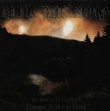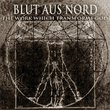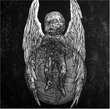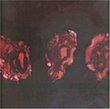| All Artists: Deathspell Omega Title: Fas -- Ite, Maledicti, In Ignem Aeternum Members Wishing: 0 Total Copies: 0 Label: Southern Lord Original Release Date: 1/1/2007 Re-Release Date: 7/17/2007 Genres: International Music, Rock, Metal Styles: Europe, Continental Europe, Death Metal Number of Discs: 1 SwapaCD Credits: 1 UPC: 808720074529 |
Search - Deathspell Omega :: Fas -- Ite, Maledicti, In Ignem Aeternum
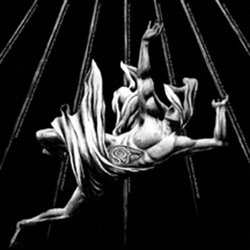 | Deathspell Omega Fas -- Ite, Maledicti, In Ignem Aeternum Genres: International Music, Rock, Metal
|
Larger Image |
CD DetailsSimilar CDs
|
CD ReviewsThe Savior of Black Metal Sterno | Little Rock, AR | 09/04/2007 (5 out of 5 stars) "Although this is primarily a review of Deathspell Omega's newest release, it can also serve as a brief intro for those unfamiliar with the band. The descriptions of the preceding works can also serve as reference points leading to a better understanding of Fas - Ite, Maledicti, in Ignem Aeternum. Deathspell Omega's first full-length, Infernal Battles, was released in 2000, and consists of primal, minimally-produced, Darkthrone worshiping, black metal. Splits with Finnish warlords Clandestine Blaze, the bewildering one-man German black metal project Moonblood, and the French Les Légions Noires stalwarts Mutiilation followed. The equally raw and bleak Inquisitors of Satan, released in 2002, ended Deathspell Omega's first phase. After what had gone before, nobody expected what the band would wreak with its 2004 release, Si Monumentum Requires, Circumspice, the first of a trilogy concerning divine will, Man's inherent perdition, and the inevitability of his eternal judgment. That release displayed a band that had leapt so far ahead of its previous incarnation as to be almost unrecognizable. Lengthy song constructions filled with dense, macabre melodic musings tangled with joy-crushing powerhouse black metal while lyrically invoking the mysteries of God, Satan, and Man's tragic and unwitting role in the eternal battle between righteousness and evil. This concept was alluded to on three releases that followed: From the Entrails to the Dirt (2005) a three-record split with French hordes Antaeus, Mutiilation, and Malicious Secrets, further consolidated Deathspell Omega's reputation as a black metal band that is challenging the genre's status quo. In 2005 the band released the EP Kénôse, a collection of songs so disturbing in their dark beauty that larger numbers in the metal community finally began to take serious notice. Also in 2005, Northern Heritage released Crushing the Holy Trinity, a very limited three-record set (1,000 copies) containing the efforts of six bands, each of which got half a side. Side one, entitled "Father" featured a nearly 23-minute opus titled "Diabolus Absconditus." With this composition, Deathspell Omega left every other black metal band in the stylistic dirt and freed itself from the constraints of a genre that had grown largely moribund. "Diabolus Absconditus" was a revelation! Deranged riffing, a five-minute acoustic interlude that sounded like hellish jazz, impossible time changes and bizarre, angular chording revealed that this Franco-Finnish ensemble was single-handedly inventing an elite of black metal trail-blazers, creating music that nobody had thought to formulate before. Now comes Deathspell Omega's latest opus, Fas - Ite, Maledicti, in Ignem Aeternum (loosely translated from the Latin, it means "By divine law, go ye cursed into eternal fire"). Simply put, it is phenomenal; quite possibly the greatest metal release I've encountered in a decade. It's beyond good. It's revolutionary. Lyrically, the band has transcended juvenile Satanic flirtation and embarked upon a fervent and erudite exploration of universal theology. It will take multiple listenings (and perhaps a few reference excursions to the Bible and Dante's Inferno) to fully comprehend the message Deathspell Omega is attempting to impart. In a nutshell, for those impatient souls, the message is this: Hopelessness. Like the last four offerings from Deathspell Omega, this release begins quietly, with a song titled "Obombration," featuring an ethereal and nebulous choir chanting over soft neoclassical musings. It's not long, however, until chaos erupts with DsO's trademark uber-heavy arpeggios lumbering about like a Satanic Pink Floyd. Mid-tempo drums anchored by a subdued double-bass rumble mark time while a sample of something that sounds like a foghorn permeates the gloomy atmosphere. This fades out after a few minutes, replaced by more mournful chanting, which eventually succumbs to silence. The second track, "The Shrine of Mad Laughter," erupts suddenly with a furious blast-beat attack, harkening back to DsO's past releases, before segueing into a convoluted maze of bent, angular riffing and drumming that's nearly impossible to comprehend, much less tap one's foot to. DsO's drummer, whoever he or she is, is a monster and gets better with each release. The percussion is metal, jazz, psychedelia, anti-music, and sheer power, all rolled into one pummeling amalgam of rhythmic insanity. The song ends with more quietude, a formula repeated throughout the album. This is a very jarring set of tunes. One is constantly jerked from the ambient interludes to the rampant black metal salvos; it is unnerving and emotionally draining. Track three, "The Bread of Bitterness," contains psychotic layers of guitar, dozens of them, augmented with something that sounds like a calliope, creating what, at times, sounds like circus music from Hell. There is an innovative mix on this cut - a male choir follows Aspa's delirious vocals, hovering just beneath the surface, a very rewarding and slightly frightening listening experience with headphones. The fourth track, "The Repellent Scars of Abandon and Election," features an insane call and response wherein a very evil sounding voice whispers each line, after which Aspa screams it in a demented sermonizing vocal style. After a minute, it switches and the whispers echo Aspa's lines. Then it all starts to overlap until voices are bombarding the listener from all directions in an anarchy of screams, whispers, howls, and moans. Very intense and harrowing! About two-thirds of the way through the song this madness suddenly abates and a slightly de-tuned piano offers a discordant melody line for a few bars before the madness begins anew. Orchestral samples and layered choirs permeate the next song, "A Chore for the Lost." More screaming, more musical bellicosity, more superb ensemble playing, more incredible black metal. Finally, it ends with a short reprise of the first song. In its execution, Fas - Ite, Maledicti, in Ignem Aeternum is jubilant and celebratory. It's crushing and evil. It's suffocating and dense. There are so many musical ideas thrown about that it's difficult to capture them all in one, or even several, listening sessions. Make no mistake - this is definitely black metal. The music contains the requisite tremolo riffing, hyper-kinetic blast-beast drumming, and scorched earth vocals that linger between a death metal growl and a traditional black metal screech. But there is so much more. The drummer flirts with jazz, psychedelia, thrash, doom, and a half dozen other styles, and masters them all. Mikko Aspa has one of the most distinct voices in metal. It's bombastic, scary, demonic, enunciated, and is instantly recognizable after just one listen. Hasjarl's guitar playing is also first rate. He peppers the tunes with shimmering, serpentine leads and light-speed riffing. His style is, at times, a black metal version of Joy Division - hovering beneath the melody, setting up the kill, waiting for the chance to attack. His inventiveness and technique are astonishing. I must reiterate that Fas - Ite, Maledicti, in Ignem Aeternum is the finest, most impressive black metal release I've ever heard, and the best metal album in any genre I've acquired in the past decade. Deathspell Omega is quietly revolutionizing the Metal universe and I anticipate the third installment of the trilogy like I've anticipated nothing else in this style of music. I suggest you order this album immediately and see what metal can be. Deathspell Omega is the savior of black metal." Beautiful Ugliness. D. West | Pittsburgh, PA. | 03/06/2009 (5 out of 5 stars) "Can the title of this review make sense? For some I'm sure it will. The review by Mr. Stern says it all. A review that is informative and comprehensive. That said, I won't belabor readers with my attempt. Anyway, I was catapulted into a void in Hell while listening to this. An utterly cold and evil sound. But, with that comes stunning musicianship and a huge amount of brilliant ideas. To me, it's the correlation of these musical ideas which are chaotic and dissonant, that complete the whole. Choirs ,chants and I swear I here a cello playing something classical. More and more is revealed with each subsequent listen. One of the most incredible albums I've ever heard." Another Tech-Metal Nightmare General Zombie | the West | 05/22/2009 (5 out of 5 stars) "I'm a rather casual black metal fan. There's some great stuff out there, sure, but kvlt kiddies are so obsessed with image, attitude and sundry other issues unrelated to music that you can't entirely trust their judgment. ("Transilvanian Hunger," for example, is unquestionably the worst purportedly great metal album I've ever heard.) Even worse, I'm more inclined towards atmospheric, epic USBM (Weakling, Leviathan, Wolves in the Throne Room, Krallice) than to the supposedly prime Scandinavian material. So my credibility is nonexistent. However, if there were more bands like France's Deathspell Omega, I would have to buy myself some white grease paint and a battleaxe. This is simply remarkable material, and I can think of few bands that I've been so exhilarated to discover in the past few years. Any fan of technical or progressive metal would be remiss to ignore DsO regardless of their thoughts on black metal generally. This is still black metal, I would say, but it's black metal unlike any you've heard before.
DsO were once a typical, primitive BM band, but with the last few releases this intentionally mysterious collective evolved dramatically. "Fas -- Ite, Maledicti, in Ignem Aeternum" could roughly be described as technical, brutal, epic and atmospheric black metal. While the shrieking tremolo riffs that define BM are in evidence, DsO have set their sights higher, drawing in tech-death stylings, including careening, seemingly formless riffs, Gorguts-esque dissonance and some of the most unhinged drumming ever recorded. Moreover, while traditionalist black metal often thrives on repetition, DsO effortlessly alternate between myriad riffs and atmospheric breaks, constructing dense, unified epics and wholly avoiding the unstructured feel that mars much extreme metal. DsO now work almost entirely in epics, but the format never seems forced, and they allow a conceptual unity that is, again, rare in extreme metal. (Though divided into different tracks, "Fas" is a sufficiently cohesive that it should be listened to in its entirety if possible.) Apart from the atmospheric "Obombration" tracks that bookend the album, "Fas" consists of 4 central tracks spanning approximately 40 minutes. "The Shrine of Mad Laughter" is a mercilessly brutal first movement that sets the tone for the album, showcasing the flailing, howling riffs, endless blastbeats and cascading toms. (You know it's a vicious track when the dissonant, odd-time break comes as a relief.) The metallic sections (sometimes a blur, sometimes off-kilter) are unrelentingly intense, but often buttressed by synths and squalling, atonal leads that add color and variety. Conversely, the atmospheric breaks sometimes seem somewhat random, but they always generate an appropriately malevolent feel. DsO even give the listener the occasional taste of melody (the sorrowful, piercing guitar lines concluding "A Chore for the Lost" and near the middle of "Bread of Bitterness"), but these moments are quickly swallowed in the maelstrom. The songwriting is sufficiently dense that the tracks are not overly differentiated, but this is an effect of their variety rather than of monotony: each track spans so many varying riffs and sections that they're difficult to label. Nevertheless, the fearsomely bleak tone is maintained throughout, connecting it all. It is the sense of wholeness that makes "Fas" so unique. Again, so many have had difficulty injecting real songwriting into extreme metal, and DsO have put virtually all other attempts to shame. This unity extends beyond the actual music to the gorgeous, well-thought out artwork and surprisingly artistic lyrics. (Such issues rarely interest me at all, and it's a testament to their quality that I even notice them at all.) Needless to say, this is not an accessible album, and even repeated listens may not reward you with a full sense of the structure. It is however, invariably striking, and most extreme metal fans will likely go away from the first listen impressed, even if they can't entirely recall what they just heard. This is my ideal tech/progressive effect: memorable enough to draw me from the first listen, but deep enough that it rewards numerous careful examinations. Even better, DsO are clearly now just hitting their stride, so we can likely look forward to more remarkable work from them. Highly recommended. " |

 Track Listings (6) - Disc #1
Track Listings (6) - Disc #1